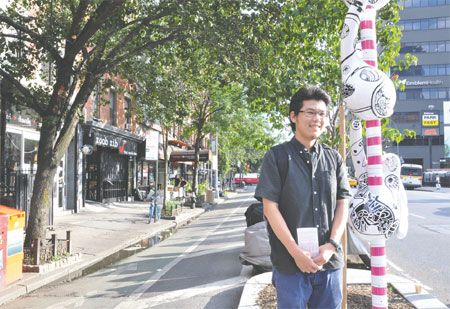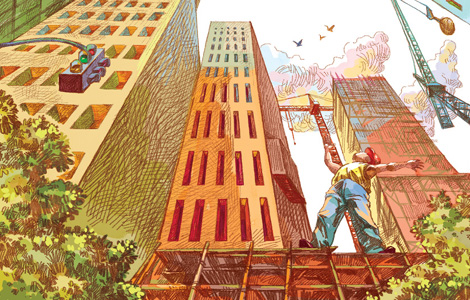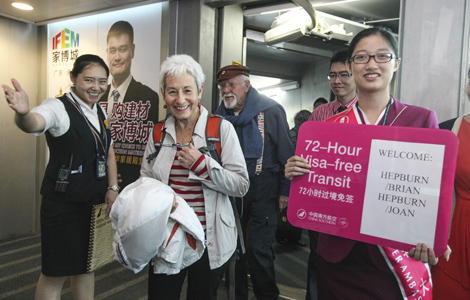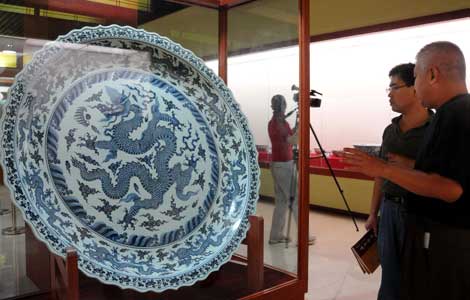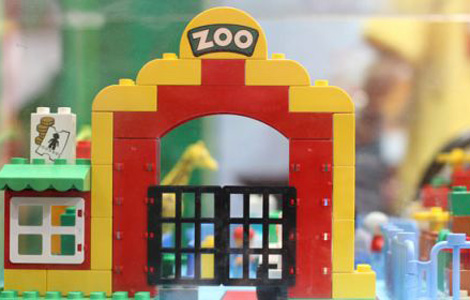Chinese art goes public in NYC
Updated: 2013-08-02 11:05
By Kelly Chung Dawson in New York (China Daily)
|
||||||||
|
Chinese artist Tang-Wei Hsu stands before his "Monkey Magic" sculpture in Manhattan, which will remain in place until May 2014. Kelly Chung Dawson / China Daily |
Above New York City Chinatown's busy Forsyth Street fruit market, five photographic banners affixed to a fence depict the obliteration of a colorful watermelon at the mouths of hungry farm animals. Uptown at 9th Avenue and 36th Street stands a whimsical anime-inspired metal sculpture.
Both works are by Chinese artists inspired by their heritage, and funded by New York City's Department of Transportation (DOT) through their participation in the International Studio & Curatorial Program (ISCP).
Jen Liu's "Melon Mysticism" and Tang-Wei Hsu's "Monkey Magic" will remain in Manhattan until May of 2014. On a recent tour of the pieces hosted by ISCP, the artists spoke about their inspiration and the generosity of the sponsors and organizations who have made it possible for Chinese artists to present public art in New York.
"I'm very happy and thankful for this special experience," said Tang-Wei Hsu. "My hope is that if you drive past or ride by the work you'll feel happy and relaxed, and it will make your day better."
The location of Hsu's sculpture was selected to highlight a DOT-constructed bike corral, sitting adjacent to the work. The department's Urban Art Program chooses artists from around the world to "transform the landscape from ordinary to extraordinary with temporary, unexpected interventions" including murals, sculptures and projections that utilize footbridges, public plazas, sidewalks and other urban space to brighten the cityscape.
The program has presented more than 100 artworks since 2008, in locales including Prospect Park in Brooklyn and below the 59th Street Bridge. The pieces by Liu and Hsu represent the third collaboration between DOT and ISCP.
"Taxpayers own the streets of New York, and we're acutely aware of that," said Wendy Feuer, assistant commissioner of urban design and art at DOT. "Everything we choose to put up, we do it because we hope taxpayers will be excited and puzzled by the work. We like to joke that we're not your grandmother's DOT. When you see art in the street now, this never happened before in an organized way. But we really have to work with groups like ISCP to make it happen, because we can't do it alone."
Hsu's piece, which features tiny monkey-like figures on a metal pole, is inspired loosely by the Asian folk tales of both the Monkey King and the Japanese Three Monkeys. But the small figures were also inspired by the birth of his son after his arrival in New York one and a half years ago, he said.
"This is about my adventure in New York, and when I made these small shapes I felt it was a similar size to my son, and he was waving hello to the world," Hsu said. "I hope the sculpture compresses time and space to become a magic box, including mystery and fiction, old and new. This is the direction of my creation."
Hsu has created a number of public artworks in Taiwan, where he was born and raised. "Monkey Magic" is his first installation in New York.
Since the nonprofit's founding in 1994, ISCP has hosted over 1,700 curators and artists from 60 countries. Chinese artists and curators have benefited from the residency-based program. Each artist is sponsored by organizations and donors, which have in the past included government agencies, arts nonprofits, a Japanese hospital, art collectors and a variety of other art enthusiasts.
Dennis Elliott, director and founder of the program, said that ISCP chooses artists who are neither recent graduates nor entirely established. The goal is for artists to interact both with each other and with the resources that ISCP can provide, including curatorial lectures, opportunities to promote their work, and trips to places like the "bowels" of the Metropolitan Museum of Modern Art building, where restoration work is done far from the eyes of the public.
"It's a privilege for these artists to be here, and can be a truly great experience for the artists and for us in hosting them," Elliott said.
Opportunities for international artists to develop public artworks in New York are rare, said ISCP special projects coordinator Juliana Cope. The collaboration between DOT and ISCP is unique for its funding and ability to provide logistical support from the city.
"The type of work we've been able to put up is also rare, in that you don't see Tang-Wei's anime-influenced humorist style of art that often in the public eye in New York," she said.
When Hsu's sculpture was being installed, the most vocally appreciative and enthusiastic passersby were almost all over the age of 40, Cope recalled. That Hsu's pop culture-inspired youthful work is so appreciated by older audiences is indicative of the playful spirit it embodies, she said.
Liu's work, for which she first carved Buddhist mandala figures into the watermelon before allowing a series of farm animals to devour the fruit, is inspired by her childhood family visits to Chinatown, she said. She had discovered a strange subset of YouTube videos in which almost any animal you could imagine seemed to love watermelon, and she began thinking about the diversity of New York's Chinatown. Although its name might imply a strictly Chinese community, the area is also home to Latino, Orthodox Jewish and Hispanic immigrants, she said.
"I really love the idea that Chinatown is a collection of communities and histories, and representative of a lot of different passages in and out of the city," she said. "The work is not meant to be a conclusive statement about the community but a messy, light-hearted and yet still serious exploration. Placing the work above Chinatown's fruit market seemed right. I'm grateful to ISCP for making it possible."
kdawson@chinadailyusa.com
(China Daily USA 08/02/2013 page11)
Most Viewed
Editor's Picks

|

|

|

|

|

|
Today's Top News
Food program aims to address security
China faces world's worst managerial shortage
Soybean is king in American exports to China
China sails through 'first island chain'
US should reclaim 10% share
Chinese worry about image abroad
China blasts US Senate resolution
NSA chief details program at hackers' conference
US Weekly

|

|
